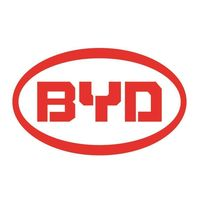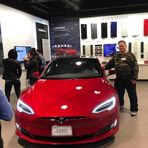Tesla's Dilemma: The Road Ahead is Paved with Challenges
March 20, 2025, 4:07 am

Location: United States, California, Los Angeles
Employees: 10001+
Founded date: 1999

Location: United States, Texas, Austin
Employees: 10001+
Founded date: 2003
Total raised: $3.86B
Tesla, once a beacon of innovation, now finds itself at a crossroads. The electric vehicle (EV) market is shifting, and the winds of change are blowing hard against the company. The landscape is littered with competitors, and Tesla's once-untouchable status is under siege.
Elon Musk, the face of Tesla, is facing a reputational crisis. His controversial actions and statements have alienated many potential customers. The brand that once stood for progress and sustainability is now tainted by political controversies and public backlash. The recent surge in Tesla's stock price feels like a mirage—a fleeting moment in an otherwise bleak scenario.
The numbers tell a stark story. Tesla's market value, once soaring above $1 trillion, is now teetering on the brink. Analysts warn that without a significant breakthrough, the company's worth could plummet to zero. The so-called "dead cat bounce"—a temporary rise in stock price amidst a downward trend—offers little comfort. Investors are jittery, and the future looks grim.
In the competitive arena of electric vehicles, Tesla is losing ground. Rivals from Asia, particularly Chinese manufacturers, are gaining momentum. Companies like BYD and Zeekr are not just nipping at Tesla's heels; they are overtaking it. BYD recently reported higher sales figures than Tesla, while Zeekr is rolling out advanced driver-assistance systems for free, a move designed to attract customers in a market that increasingly values technology and affordability.
The EV market in China is a battleground. Zeekr's decision to offer advanced driver-assistance capabilities at no cost is a strategic play. It’s a bold move that could lure customers away from Tesla, which has been criticized for its high-priced Full Self Driving software. The competition is fierce, and Tesla's once-loyal customer base is exploring alternatives.
Tesla's sales figures are alarming. Registrations in key markets like Scandinavia and France have plummeted. In China, deliveries fell by 50% in February, even as the overall EV market surged. This decline is a clear signal that Tesla is losing its grip. The company’s reputation is suffering, and the public's trust is waning.
Musk's relationship with the political landscape adds another layer of complexity. His ties to controversial figures have sparked protests among Tesla owners. The juxtaposition of Musk's political affiliations against the backdrop of a struggling company creates a dissonance that is hard to ignore. The brand that once symbolized hope and innovation is now embroiled in a narrative of division and dissent.
The future of Tesla hinges on innovation. The much-anticipated driverless vehicle or "robotaxi" could be the silver bullet the company desperately needs. However, the clock is ticking. The market is evolving, and Tesla must adapt quickly. The competition is not waiting.
Zeekr's advanced driver-assistance system, powered by cutting-edge technology, is a testament to the rapid advancements in the EV sector. The use of Nvidia chips and lidar technology showcases a commitment to safety and innovation. As Zeekr and other competitors ramp up their offerings, Tesla must respond with urgency.
The stakes are high. Tesla's once-lofty valuation was built on the promise of future innovations. But as those promises remain unfulfilled, skepticism grows. Investors are beginning to question whether Tesla can reclaim its former glory. The company’s high price-earnings ratio, once a badge of honor, is now a source of concern.
Musk's genius as a disruptor is being overshadowed by his missteps. The narrative has shifted from admiration to apprehension. The market is watching closely, and the pressure is mounting.
In the grand scheme, Tesla's journey is a cautionary tale. The rise and fall of a titan in the EV industry serves as a reminder that success is not guaranteed. The road ahead is fraught with challenges, and the company must navigate them skillfully.
The electric vehicle market is not just about cars; it's about perception, trust, and innovation. Tesla must work diligently to rebuild its reputation and regain the confidence of consumers. The competition is relentless, and the landscape is changing rapidly.
In conclusion, Tesla stands at a pivotal moment. The challenges are daunting, but the potential for redemption exists. With a renewed focus on innovation and a commitment to addressing reputational issues, Tesla can chart a new course. The journey will be difficult, but the destination could be worth the struggle. The road ahead is paved with challenges, but it is not yet closed off. The question remains: can Tesla rise to the occasion? Only time will tell.
Elon Musk, the face of Tesla, is facing a reputational crisis. His controversial actions and statements have alienated many potential customers. The brand that once stood for progress and sustainability is now tainted by political controversies and public backlash. The recent surge in Tesla's stock price feels like a mirage—a fleeting moment in an otherwise bleak scenario.
The numbers tell a stark story. Tesla's market value, once soaring above $1 trillion, is now teetering on the brink. Analysts warn that without a significant breakthrough, the company's worth could plummet to zero. The so-called "dead cat bounce"—a temporary rise in stock price amidst a downward trend—offers little comfort. Investors are jittery, and the future looks grim.
In the competitive arena of electric vehicles, Tesla is losing ground. Rivals from Asia, particularly Chinese manufacturers, are gaining momentum. Companies like BYD and Zeekr are not just nipping at Tesla's heels; they are overtaking it. BYD recently reported higher sales figures than Tesla, while Zeekr is rolling out advanced driver-assistance systems for free, a move designed to attract customers in a market that increasingly values technology and affordability.
The EV market in China is a battleground. Zeekr's decision to offer advanced driver-assistance capabilities at no cost is a strategic play. It’s a bold move that could lure customers away from Tesla, which has been criticized for its high-priced Full Self Driving software. The competition is fierce, and Tesla's once-loyal customer base is exploring alternatives.
Tesla's sales figures are alarming. Registrations in key markets like Scandinavia and France have plummeted. In China, deliveries fell by 50% in February, even as the overall EV market surged. This decline is a clear signal that Tesla is losing its grip. The company’s reputation is suffering, and the public's trust is waning.
Musk's relationship with the political landscape adds another layer of complexity. His ties to controversial figures have sparked protests among Tesla owners. The juxtaposition of Musk's political affiliations against the backdrop of a struggling company creates a dissonance that is hard to ignore. The brand that once symbolized hope and innovation is now embroiled in a narrative of division and dissent.
The future of Tesla hinges on innovation. The much-anticipated driverless vehicle or "robotaxi" could be the silver bullet the company desperately needs. However, the clock is ticking. The market is evolving, and Tesla must adapt quickly. The competition is not waiting.
Zeekr's advanced driver-assistance system, powered by cutting-edge technology, is a testament to the rapid advancements in the EV sector. The use of Nvidia chips and lidar technology showcases a commitment to safety and innovation. As Zeekr and other competitors ramp up their offerings, Tesla must respond with urgency.
The stakes are high. Tesla's once-lofty valuation was built on the promise of future innovations. But as those promises remain unfulfilled, skepticism grows. Investors are beginning to question whether Tesla can reclaim its former glory. The company’s high price-earnings ratio, once a badge of honor, is now a source of concern.
Musk's genius as a disruptor is being overshadowed by his missteps. The narrative has shifted from admiration to apprehension. The market is watching closely, and the pressure is mounting.
In the grand scheme, Tesla's journey is a cautionary tale. The rise and fall of a titan in the EV industry serves as a reminder that success is not guaranteed. The road ahead is fraught with challenges, and the company must navigate them skillfully.
The electric vehicle market is not just about cars; it's about perception, trust, and innovation. Tesla must work diligently to rebuild its reputation and regain the confidence of consumers. The competition is relentless, and the landscape is changing rapidly.
In conclusion, Tesla stands at a pivotal moment. The challenges are daunting, but the potential for redemption exists. With a renewed focus on innovation and a commitment to addressing reputational issues, Tesla can chart a new course. The journey will be difficult, but the destination could be worth the struggle. The road ahead is paved with challenges, but it is not yet closed off. The question remains: can Tesla rise to the occasion? Only time will tell.
